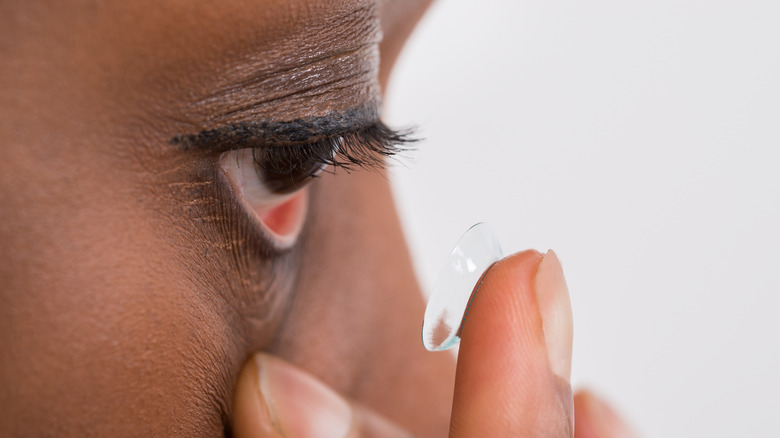You Should Stop Wearing Contacts If This Happens To You
Contacts are amazing devices. They allow people to adjust their vision without glasses, which can often get smudged, broken, or lost. Contacts offer a versatility that many people don't feel they get with glasses. There are even costume contacts available for people who want to change their eye color, though buying over-the-counter colored contact lenses can be extremely dangerous.
That's not to say that prescription contacts don't come with their own set of dangers, many of which contact wearers are not informed of. These can include infections, corneal ulcers, and even blindness, according to the Food and Drug Administration (FDA). Of course these conditions develop for very specific reasons, the most common of which is improper contact handling and storage. Behaviors like handling contacts without washing your hands, topping off old contact fluid, and not periodically cleaning your contact case all increase your chances of infection.
And while changing your habits can reduce your risk of infection, it's still important to know the early signs of contact-related issues. Knowing the symptoms can help catch infections early on before they develop into something worse.
Symptoms of contact lens eye irritation
The FDA lists several symptoms that contact lens wearers should pay attention to. They range from the vague, like general discomfort, to more specific symptoms like excess tearing and discharge from the eyes. Other symptoms include an itching or burning sensation, blurred vision, swelling, pain, redness, and sensitivity to light that is unrelated to a migraine.
These symptoms can occur for several reasons. Bausch and Lomb, a company that produces contact lenses and other eye-related products, states that these factors can range from environmental stimuli like allergies to contact-induced dry eyes. Over-the-counter products can treat both causes, either by reducing a person's histamine reaction or by providing additional tears for people who cannot make enough to keep both their eyes and their contacts moist.
Other causes can only be treated by an optometrist, however, such as underlying conditions in the eye or the tissue surrounding it. Symptoms may also be caused by improperly fitted contacts which can be corrected with an updated prescription.


